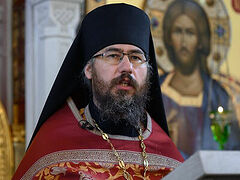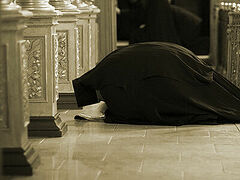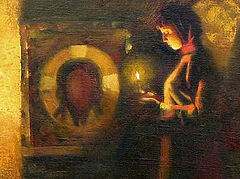Through love we learn to pray, and through prayer we learn to love. Experienced pastors and confessors have talked about the meaning of temptations and learning how to pray regardless of circumstances.
Prayer is Required from Each of Us Today
Protopresbyter Vladimir Divakov, Secretary of the Patriarch of Moscow and All Russia in the city of Moscow, rector of the Church of the Ascension of the Lord at Nikitsky Gate (“Great Ascension”) in Moscow:
Do you think there is a unique rule for learning how to to pray? Each person tunes his soul into the mood for prayer in his own way. Some pray constantly, others occasionally cry out to God after being shaken up hard, or prayer appears when anxiety creeps into the soul—it seems to be otherwise difficult to induce oneself to pray.
It is known that when churches are empty, a tragedy is sure to happen. The Fathers used to say: “It is a sign of something bad.” I remember Metropolitan Joseph (Chernov) of Alma-Ata and Kazakhstan. Once he came to our Church of St. Nicholas in Khamovniki to venerate the icon of the Mother of God “The Surety of Sinners”. I was serving there at the time, and we got into conversation. He told me how on returning from exile he had come there on Christmas Eve in 1941. There were about a dozen believers in the church. “I didn’t believe my eyes!” he said. “As we were languishing in prisons we believed that since the authorities had closed most churches, the rest must be packed. But I hardly saw anyone in the church. The Lord said: the gates of hell shall not prevail against it (Mt. 16:18). Have they already prevailed?” When he came to his diocese in Petropavlovsk (where he was sent after prison), he couldn’t believe his eyes again: there were no people in churches. “And again,” he confessed later, “I lost heart: the gates of hell will not prevail against the Church, but they have almost done it! I couldn’t have imagined then that a few months would pass and churches wouldn’t be able to accommodate people.” Because the Great Patriotic War1 would break out.
Later he kept telling us: “Don’t be like me, one of little faith. I thought: ‘It’s the end! It’s all over with the Church! No, I shouldn’t have despaired.” Likewise, I am now trying to inspire younger clergy: “Fathers, treasure what you have now, appreciate services or later you may sigh: ‘Oh, we lived like in Paradise.’” The New Martyrs and Confessors would remember services in prisons and camps. Earlier in history it had been the same—for example, during the Polish invasion and the devastation at the hands of our own rulers.
This is the mystery of God’s Providence: Sometimes the Lord raises His faithful up to Golgotha, and sometimes because of our sins He allows the devil to act. It is said: For the time is come that judgment must begin at the house of God (1 Pet. 4:17). The power of evil manifests itself in the Church too: in Ukraine it provokes strife to undermine the unity of the Orthodox Church. This applies not only to Ukraine, but to the whole globe.
Now our joint prayer must intensify; prayer is required in our days from each of us. Are we still sleeping and resting? “They won’t lock the barn door till after the horse has bolted.” This has all been known and experienced for centuries.
As a child I was in Belarus with my grandmother during the war. In the evening our wounded soldiers in the hut quieted down, their serious wounds were bandaged and they were put to bed. At night we could see one of them standing with a candle, waving his hand, making the sign of the cross, recollecting how the elders had done it before. In the morning I saw him turning ash over in the stove—he had thrown his Communist Party card had into the flame but it passed over the burning coals; he then returned it to the fire from the back wall with a poker.
You need to train yourself to remember prayer all the time
Archpriest Valerian Krechetov, honorary rector of the Churches of the Protecting Veil of the Mother of God and the New Martyrs and Confessors of the Russian Church in Akulovo near Moscow:
In order to learn how to pray you must pray. All you need is determination. Start with small things: always read the morning and evening prayers. We differ from the saints by our inconsistency, as New Priest-Martyr Sergei Mechev said. You miss your prayer rule once, then twice, a third time, and then you stop praying altogether—and it is difficult to start up again. The first sign of mental confusion is the unwillingness to pray.
When my father was a seminarian, an old professor asked him during an exam: “What does the Lord do with a person when He wants to draw him to Himself?” My father answered something. “What is the main point?” the examiner asked him again. My father was silent. “He sends him a heartache.” That’s when we begin to pray!
As the saying goes, a mother’s prayer will reach the bottom of the sea. One woman related the following story. Her son was a submariner. She went on a pilgrimage to the Holy Land and stayed to work there as a volunteer. One day she felt such an urge to pray that she went to the Church of the Holy Sepulcher and prayed for a long time. When she returned to the convent she heard that exactly as she had been praying, her son’s submarine had sunk to the bottom of the sea as the equipment had gone dead. The son later recalled that they all had prayed there—believers and atheists, Christians and Muslims. That was when the real praying started! As they say, he who has not swam in the sea has not prayed to God. Then suddenly the equipment started working again and the submarine went up.
Here in Akulovo, Vladyka Stephen (Nikitin)2 is buried by the altar of the Holy Protection Church. I personally knew him. Holy Blessed Matrona of Anemnyasevo miraculously freed him from prison. On a nurse’s advice he prayed to her on an empty lot by the fence of the prison camp. St. Matrona heard him from hundreds of miles away and he was soon released. Afterwards, when he served, parishioners complained: “We have no time to pray!” He would reply: “Do you peel potatoes? So pray while doing it!” Later the housewives admitted, “Whenever I take a potato into my hand, I recall his advice.”
You need to train yourself to remember prayer all the time as it is really necessary. As soon as something happens—for example, you lost something that was just nearby—don’t swear, but pray immediately. All that is given to us, every situation, is the mercy of God. Anywhere, anytime. So learn to pray. Then nothing will be able to stop you.
When a person gets used to prayer, he can even work as a doorman. I know such a case: Constant noise, people entering in and milling around, but he says the Jesus Prayer inwardly. Archpriest Tikhon Pelikh (1895–1983; a spiritual elder—he is buried in Akulovo behind the altar) had a spiritual son who was a schemamonk. The great schema presupposes unceasing inner prayer. At the same time he was a colonel, the head of a Military Academy department, and a teacher. Another example: The is a woman buried at the cemetery across the rail tracks here. Archpriest Vasily Serebrennikov (1907–1996; another spiritual elder) testified that she prayed unceasingly. Some complain that something distracts them from prayer all the time. But whenever that woman stood for the morning or evening rule, she turned on the radio at full volume. If she couldn’t hear it, it meant she was concentrated on prayer; if she understood what they were talking about, it meant her thoughts were wandering.
Why temptations are allowed to happen to us?
Hieroschemamonk Valentin (Gurevich), the father-confessor of the Moscow Donskoy Monastery:
Prayer during temptation should, above all else, be penitential. The Book of Daniel offers us an example of such prayer. The three youths, having been thrown into a fiery furnace, neither grumbled, nor protested, but in a prayer humbly accepted the rightness of the Lord’s judgment: All Thy judgements are truth, with our fathers we have sinned, committed iniquity and done wrong in Thy sight, did not keep Thy commandments, neither done as Thou hast commanded us. But deliver us not up wholly, O God of our fathers! (cf. Dan., Prayer of Azariah, 1:5–11, and the irmos of the seventh ode of the Great Canon of St. Andrew of Crete). It is this very humble prayer that brought down God’s abundant grace, extinguishing the flames of the furnace and saving the lives of the martyrs, who instead of murmuring, raised unto the Lord the great song of thanksgiving and praise: Let the heavens and earth and all on it bless the Lord: praise and exalt him above all for ever! (cf. Dan., Prayer of Azariah, 1:36,52,54).
The same Biblical penitential tone, as humble as the prayer of the three youths in the Babylonian furnace, we hear in the prayer of St. Tikhon, Patriarch of Moscow, which was written in the time of great persecution. He even uses the same words and phrases as were once uttered in the furnace in Babylon: “We have forsaken Thee, O Lord, we kept not Thy commandments, neither done as Thou commanded us. Therefore Thine wrath and fierce anger are upon us, and for our transgressions Thou hast visited us with the rod of iron, and afflicted us for our iniquities… Thou suffered us to be trampled upon by our enemies, Thou hast counted us lower than all nations, and made us a byword of reproach to our neighbors. Our loins have become faint with disease, we are ill with iniquity and give birth to transgression…”
The history of a people is like the life of a person. The Lord guides the human soul to salvation, allowing the soul to fall, so that it wil not become proud. Pride is a satanic quality that deprives the soul of grace and, ultimately, the Kingdom of Heaven.
The peoples chosen by God for a special mission designed for salvation of all mankind, from some awareness of their “chosenness”, are prone to the temptation of becoming proud and exalting themselves above other peoples.
On the one hand, the enemy viciously attacks people of God as well as the saints of God. On the other hand, the Lord allows the enemy to succeed, and His chosen ones to fall, so that they would humble themselves and overcome pride, convinced of their helplessness and failure when God leaves them alone with their weaknesses and the old enemy.
There can be no excuse for pride. In response to the words of one nobleman that he had a “noble pride” in his social origin, St. Ambrose of Optina said, “Eh, my friend, there is no such thing as noble pride; pride is always the same—it’s demonic.”
The same applies to the pride of nations chosen by God. The Lord is sometimes slow to help them and allows His people to fall for their humility and salvation.
Following their spiritual leader—His Holiness Tikhon—the multitudes of New Martyrs and Confessors of Russia offered up humble prayers of repentance for their people. They were “thrown into the furnace” of a new Babylonian captivity—they were exiled to harsh and deserted places of Siberia, the taiga, the tundra, and wilderness. Imprisoned in terrible special regime camps where all life was torture, they overstrained themselves with bitter and unbearable labor.
Without a broken spirit and repentance it wouldn’t have been possible to accept and endure everything.
In temptations our prayer can only be penitent. Temptations are often sent to get people to turn to repentance.
In the early 1990s, Metropolitan Theodosius (Lazor), the then Primate of OCA, in his sermon at the liturgy in the small cathedral of our Donskoy monastery, asked the parishioners: “Pray for my compatriots. They are so materialistic! They say: ‘I have everything I want! Why do I need God?’” This is a manifestation of the spiritual law which the metropolitan was fully aware of—that material well-being can be to the detriment of spiritual well-being, for a rich man shall hardly enter into the Kingdom of Heaven (Mt. 19:23).
We don’t assert that it is generally a sin to wish your loved ones earthly blessings. But the desire for spiritual goods should be above all. At the end of every prayer one should add: “Nevertheless not my will, but Thine, be done.”
Why are temptations blessings?
Metropolitan Nicholas of Mesogaia and Lavreotiki, the Church of Greece:
The problem is that we don’t live in the perspective of eternity and communion with God. We are “Christians” who read prayer rules but don’t pray, abstain from meat and dairy products but don’t fast, go to church and list our sins at confession but don’t repent. Even when taking Communion we don’t partake of the Body and Blood of Christ. We know so much from books, but there is no knowledge of the True God in our hearts. I am saying this with regret and about myself too. We are always ready to give advice to others, but when temptations touch us, we break down.
In the Lord’s Prayer we say, “And lead us not into temptation.” But what does the Epistle of the Apostle James tell us? Count it all joy when ye fall into divers temptations (Js. 1:2). When you are tempted, appreciate this experience. Why? Because in another epistle we read: God is faithful, Who will not suffer you to be tempted above that ye are able; but will with the temptation also make a way to escape, that ye may be able to bear it (1 Cor. 10:13). Christ doesn’t leave us without help if we turn to Him. In that He Himself hath suffered being tempted, He is able to succour them that are tempted (Heb. 2:18). This is why temptations are blessings. The Lord allows the devil to tempt us so we may put the enemy to shame.







